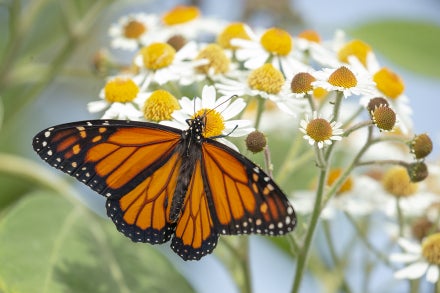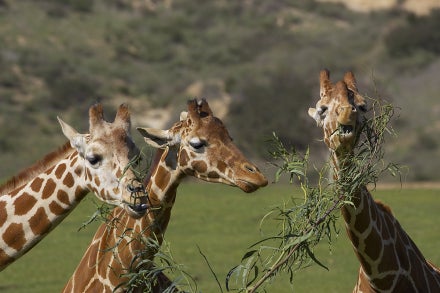Image

Zoo InternQuest is a seven-week career exploration program for San Diego County high school juniors and seniors. Students have the unique opportunity to meet professionals working for the San Diego Zoo, Safari Park, and Institute for Conservation Research, learn about their jobs, and then blog about their experience online. Follow their adventures here on the Zoo’s website!
 What do you think of when you hear the word “insect?” Many people would be grossed out, I’m sure. What they don’t know, however, is how important insects are to ecosystems. See that fly over there? He may seem dirty, but he helps clean up the messes left behind by other members of the ecosystem. He’s a decomposer, which means he breaks down any leftover organic material (like rotting fruit or biological waste). What about those bumbling bees? Their stingers are sharp, but without bees, there would be far fewer plants in the world. Bees are pollinators, and they assist in the reproduction of flowers by moving pollen from one plant to the next. There are many other insects that are beneficial to our environment--more than I can count!
The keepers at the San Diego Zoo understand the critical role that insects play in ecosystems. Mr. Brandon Rowley, an Insect Keeper, is working to convince the general public of how important insects are to the world. Informing people can be difficult at the Zoo because many people overlook the Insect House. As a result, Mr. Rowley says it can be challenging to get the Zoo’s message across about the beneficial influence of insects on our environment. He says, however, that when he does get the message across, it’s truly rewarding. Personally, Mr. Rowley believes that the best way to spread the word about insect conservation is to explain local conservation efforts to Zoo visitors. This encourages people to get engaged with local efforts across the country and encourages the public to be active and learn what they can do to help.
Mr. Rowley says that no one insect is the most important in our world’s ecosystems. Just removing a single species can have catastrophic effects on the local environment. They all serve a purpose! One local species that is almost on the brink of extinction is the quino checkerspot butterfly, an insect native to Southern California and Northern Mexico. Due to agricultural and urban development in the quino checkerspot butterfly’s natural habitat, its numbers are now waning. These butterflies play several roles in their environment, such as pollinating plants and acting as food for other animals. Mr. Rowley and the Zoo are working toward getting the quino checkerspot butterfly’s numbers back up by raising them in captivity and then releasing them into the wild. Hopefully, their population will begin to rise so that these fancy flappers can play their part in the ecosystem once again.
Ms. Ester Chang, a Senior Insect Keeper, is also assisting with the Zoo’s conservation efforts. Just to put things into perspective, Ms. Chang says that of the 1 million described species of insects, there are 10 million more that have yet to be discovered. Yowza! While Ms. Chang says that you don’t have to like insects, you should at least be aware of their presence and contributions in our world. If you want to help with local insect conservation, then Ms. Chang has a few tips. Rather than using insecticides to fend off bugs that are harming your plants, consider some non-lethal alternatives. Plants with odors that are unpleasant towards insects, such as marigolds, can be planted near your other plants to keep bugs at bay without causing harm to the insects themselves. Also consider putting some native plants in your garden. Native plants have developed their own system of defense against many insects, therefore reducing or eliminating the need for harmful pesticides. The most important thing to keep in mind is to consider how your actions might affect the ecosystem around you in ways that might be hard to see. Every little move you make could have big consequences for an insect!
Getting to talk to two major players in the Zoo’s Insect Department showed the interns just how important insects are to the world around us. We learned not only how to protect local insect populations from extinction, but also how to educate others about the importance of insect conservation. From pollinating pretty petunias to decomposing deplorable dung, each insect serves a purpose, no matter how small.
David, Conservation Team
Week Two, Fall 2016
What do you think of when you hear the word “insect?” Many people would be grossed out, I’m sure. What they don’t know, however, is how important insects are to ecosystems. See that fly over there? He may seem dirty, but he helps clean up the messes left behind by other members of the ecosystem. He’s a decomposer, which means he breaks down any leftover organic material (like rotting fruit or biological waste). What about those bumbling bees? Their stingers are sharp, but without bees, there would be far fewer plants in the world. Bees are pollinators, and they assist in the reproduction of flowers by moving pollen from one plant to the next. There are many other insects that are beneficial to our environment--more than I can count!
The keepers at the San Diego Zoo understand the critical role that insects play in ecosystems. Mr. Brandon Rowley, an Insect Keeper, is working to convince the general public of how important insects are to the world. Informing people can be difficult at the Zoo because many people overlook the Insect House. As a result, Mr. Rowley says it can be challenging to get the Zoo’s message across about the beneficial influence of insects on our environment. He says, however, that when he does get the message across, it’s truly rewarding. Personally, Mr. Rowley believes that the best way to spread the word about insect conservation is to explain local conservation efforts to Zoo visitors. This encourages people to get engaged with local efforts across the country and encourages the public to be active and learn what they can do to help.
Mr. Rowley says that no one insect is the most important in our world’s ecosystems. Just removing a single species can have catastrophic effects on the local environment. They all serve a purpose! One local species that is almost on the brink of extinction is the quino checkerspot butterfly, an insect native to Southern California and Northern Mexico. Due to agricultural and urban development in the quino checkerspot butterfly’s natural habitat, its numbers are now waning. These butterflies play several roles in their environment, such as pollinating plants and acting as food for other animals. Mr. Rowley and the Zoo are working toward getting the quino checkerspot butterfly’s numbers back up by raising them in captivity and then releasing them into the wild. Hopefully, their population will begin to rise so that these fancy flappers can play their part in the ecosystem once again.
Ms. Ester Chang, a Senior Insect Keeper, is also assisting with the Zoo’s conservation efforts. Just to put things into perspective, Ms. Chang says that of the 1 million described species of insects, there are 10 million more that have yet to be discovered. Yowza! While Ms. Chang says that you don’t have to like insects, you should at least be aware of their presence and contributions in our world. If you want to help with local insect conservation, then Ms. Chang has a few tips. Rather than using insecticides to fend off bugs that are harming your plants, consider some non-lethal alternatives. Plants with odors that are unpleasant towards insects, such as marigolds, can be planted near your other plants to keep bugs at bay without causing harm to the insects themselves. Also consider putting some native plants in your garden. Native plants have developed their own system of defense against many insects, therefore reducing or eliminating the need for harmful pesticides. The most important thing to keep in mind is to consider how your actions might affect the ecosystem around you in ways that might be hard to see. Every little move you make could have big consequences for an insect!
Getting to talk to two major players in the Zoo’s Insect Department showed the interns just how important insects are to the world around us. We learned not only how to protect local insect populations from extinction, but also how to educate others about the importance of insect conservation. From pollinating pretty petunias to decomposing deplorable dung, each insect serves a purpose, no matter how small.
David, Conservation Team
Week Two, Fall 2016
 What do you think of when you hear the word “insect?” Many people would be grossed out, I’m sure. What they don’t know, however, is how important insects are to ecosystems. See that fly over there? He may seem dirty, but he helps clean up the messes left behind by other members of the ecosystem. He’s a decomposer, which means he breaks down any leftover organic material (like rotting fruit or biological waste). What about those bumbling bees? Their stingers are sharp, but without bees, there would be far fewer plants in the world. Bees are pollinators, and they assist in the reproduction of flowers by moving pollen from one plant to the next. There are many other insects that are beneficial to our environment--more than I can count!
The keepers at the San Diego Zoo understand the critical role that insects play in ecosystems. Mr. Brandon Rowley, an Insect Keeper, is working to convince the general public of how important insects are to the world. Informing people can be difficult at the Zoo because many people overlook the Insect House. As a result, Mr. Rowley says it can be challenging to get the Zoo’s message across about the beneficial influence of insects on our environment. He says, however, that when he does get the message across, it’s truly rewarding. Personally, Mr. Rowley believes that the best way to spread the word about insect conservation is to explain local conservation efforts to Zoo visitors. This encourages people to get engaged with local efforts across the country and encourages the public to be active and learn what they can do to help.
Mr. Rowley says that no one insect is the most important in our world’s ecosystems. Just removing a single species can have catastrophic effects on the local environment. They all serve a purpose! One local species that is almost on the brink of extinction is the quino checkerspot butterfly, an insect native to Southern California and Northern Mexico. Due to agricultural and urban development in the quino checkerspot butterfly’s natural habitat, its numbers are now waning. These butterflies play several roles in their environment, such as pollinating plants and acting as food for other animals. Mr. Rowley and the Zoo are working toward getting the quino checkerspot butterfly’s numbers back up by raising them in captivity and then releasing them into the wild. Hopefully, their population will begin to rise so that these fancy flappers can play their part in the ecosystem once again.
Ms. Ester Chang, a Senior Insect Keeper, is also assisting with the Zoo’s conservation efforts. Just to put things into perspective, Ms. Chang says that of the 1 million described species of insects, there are 10 million more that have yet to be discovered. Yowza! While Ms. Chang says that you don’t have to like insects, you should at least be aware of their presence and contributions in our world. If you want to help with local insect conservation, then Ms. Chang has a few tips. Rather than using insecticides to fend off bugs that are harming your plants, consider some non-lethal alternatives. Plants with odors that are unpleasant towards insects, such as marigolds, can be planted near your other plants to keep bugs at bay without causing harm to the insects themselves. Also consider putting some native plants in your garden. Native plants have developed their own system of defense against many insects, therefore reducing or eliminating the need for harmful pesticides. The most important thing to keep in mind is to consider how your actions might affect the ecosystem around you in ways that might be hard to see. Every little move you make could have big consequences for an insect!
Getting to talk to two major players in the Zoo’s Insect Department showed the interns just how important insects are to the world around us. We learned not only how to protect local insect populations from extinction, but also how to educate others about the importance of insect conservation. From pollinating pretty petunias to decomposing deplorable dung, each insect serves a purpose, no matter how small.
David, Conservation Team
Week Two, Fall 2016
What do you think of when you hear the word “insect?” Many people would be grossed out, I’m sure. What they don’t know, however, is how important insects are to ecosystems. See that fly over there? He may seem dirty, but he helps clean up the messes left behind by other members of the ecosystem. He’s a decomposer, which means he breaks down any leftover organic material (like rotting fruit or biological waste). What about those bumbling bees? Their stingers are sharp, but without bees, there would be far fewer plants in the world. Bees are pollinators, and they assist in the reproduction of flowers by moving pollen from one plant to the next. There are many other insects that are beneficial to our environment--more than I can count!
The keepers at the San Diego Zoo understand the critical role that insects play in ecosystems. Mr. Brandon Rowley, an Insect Keeper, is working to convince the general public of how important insects are to the world. Informing people can be difficult at the Zoo because many people overlook the Insect House. As a result, Mr. Rowley says it can be challenging to get the Zoo’s message across about the beneficial influence of insects on our environment. He says, however, that when he does get the message across, it’s truly rewarding. Personally, Mr. Rowley believes that the best way to spread the word about insect conservation is to explain local conservation efforts to Zoo visitors. This encourages people to get engaged with local efforts across the country and encourages the public to be active and learn what they can do to help.
Mr. Rowley says that no one insect is the most important in our world’s ecosystems. Just removing a single species can have catastrophic effects on the local environment. They all serve a purpose! One local species that is almost on the brink of extinction is the quino checkerspot butterfly, an insect native to Southern California and Northern Mexico. Due to agricultural and urban development in the quino checkerspot butterfly’s natural habitat, its numbers are now waning. These butterflies play several roles in their environment, such as pollinating plants and acting as food for other animals. Mr. Rowley and the Zoo are working toward getting the quino checkerspot butterfly’s numbers back up by raising them in captivity and then releasing them into the wild. Hopefully, their population will begin to rise so that these fancy flappers can play their part in the ecosystem once again.
Ms. Ester Chang, a Senior Insect Keeper, is also assisting with the Zoo’s conservation efforts. Just to put things into perspective, Ms. Chang says that of the 1 million described species of insects, there are 10 million more that have yet to be discovered. Yowza! While Ms. Chang says that you don’t have to like insects, you should at least be aware of their presence and contributions in our world. If you want to help with local insect conservation, then Ms. Chang has a few tips. Rather than using insecticides to fend off bugs that are harming your plants, consider some non-lethal alternatives. Plants with odors that are unpleasant towards insects, such as marigolds, can be planted near your other plants to keep bugs at bay without causing harm to the insects themselves. Also consider putting some native plants in your garden. Native plants have developed their own system of defense against many insects, therefore reducing or eliminating the need for harmful pesticides. The most important thing to keep in mind is to consider how your actions might affect the ecosystem around you in ways that might be hard to see. Every little move you make could have big consequences for an insect!
Getting to talk to two major players in the Zoo’s Insect Department showed the interns just how important insects are to the world around us. We learned not only how to protect local insect populations from extinction, but also how to educate others about the importance of insect conservation. From pollinating pretty petunias to decomposing deplorable dung, each insect serves a purpose, no matter how small.
David, Conservation Team
Week Two, Fall 2016



